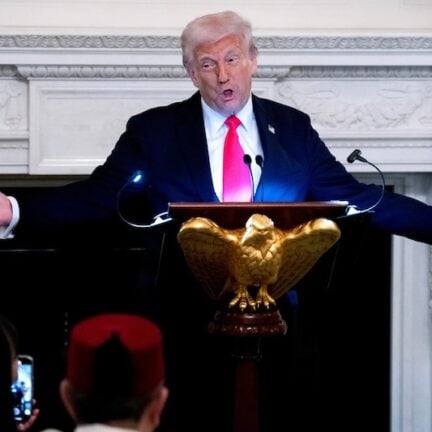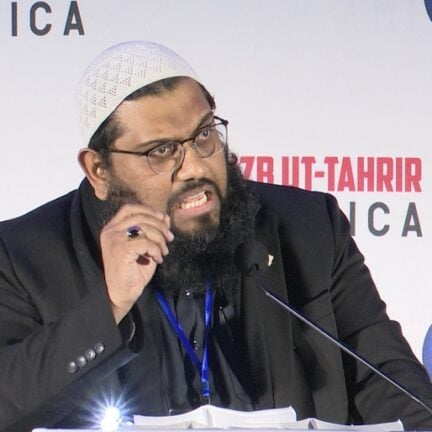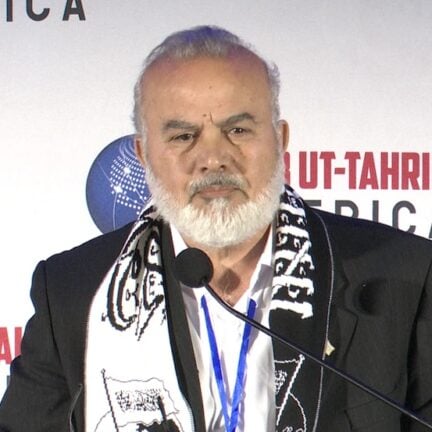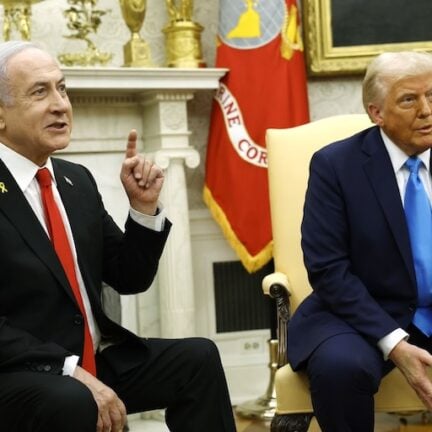The Khilafah is a common leadership for all the Muslims in the world. Its role is to establish the laws of the Islamic Shari’ah and to carry the Da’wah of Islam to the world. The Khilafah is also known as the Imamah, both terms have the same meaning. Several Sahih Ahadith mention them with the same meaning, neither of the two terms has ever differed in meaning in any Shari’ah text i.e. the Qur’an or the Sunnah of the Prophet (saw), these being the only Shari’ah texts. It is not compulsory to hold to the term of Khilafah or Imamah, but rather it is compulsory to hold to the meaning of the term.
The establishment of a Khaleefah is an obligation upon all Muslims in the world. Performing this duty, like any of the duties prescribed by Allah (swt) upon the Muslims, is an urgent obligation in which there can be no choice or complacency. Negligence in performing this duty is one of the greatest sins, for which Allah (swt) punishes severely. The evidence that the appointment of a Khaleefah is obligatory upon all Muslims is found in the Sunnah and the Ijma’a (consensus) of the Sahabah.
As for the Sunnah, Nafi’a reported saying: “Abdullah ibn Umar said to me that he heard the Prophet (saw) saying: ‘Whosoever takes off his hand from allegiance to Allah (swt) will meet Him (swt) on the Day of Resurrection without having any proof for him, and whoso dies whilst there was no Bay’ah (allegiance) on his neck (to a Khaleefah), he dies a death of Jahiliyyah (ignorance).’” [Muslim]
So the Prophet (saw) made it compulsory upon every Muslim to have a Bay’ah on his neck, and described whoever dies without a Bay’ah on his neck that he dies a death of Jahiliyyah. The Bay’ah cannot be for anyone except the Khaleefah, and the Prophet (saw) made it obligatory upon every Muslim to have on his neck a Bay’ah to a Khaleefah. Yet he did not make it an obligation upon every Muslim to give Bay’ah to a Khaleefah. The duty is the existence of a Bay’ah on the neck of every eligible Muslim, i.e. the existence of a Khaleefah who accordingly deserves a Bay’ah upon the neck of every Muslim. So it is the presence of the Khaleefah which places a Bay’ah on the neck of every Muslim, whether the Muslim gave a Bay’ah to him in person or not.
Therefore, this Hadith of the Prophet (saw) is an evidence that the appointment of the Khaleefah is an obligation and not a proof that giving the Bay’ah is obligatory. This is because the Prophet (saw) rebuked the Muslim who has no Bay’ah on his neck until he dies, not the one who did not give Bay’ah.
Hisham ibn Urwa reported on the authority of Abu Saleh on the authority of Abu Hurayrah that the Prophet (saw) said: “Leaders will take charge of you after me, where the pious (one) will lead you with his piety and the impious (one) with his impiety, so listen to them and obey them in everything which conforms with the truth. If they act rightly it is for your credit, and if they acted wrongly it is counted for you and against them.”
Muslim narrated on the authority of al-A’araj, on the authority of Abu Hurayrah, that the Prophet (saw) said: “Behold, the Imam is but a shield from behind whom the people fight and by whom they protect themselves.”
Muslim reported on the authority of Abu Hazim, who said: “I accompanied Abu Hurayrah for five years and heard him talking of the saying of the Prophet (saw): ‘The Prophets ruled over the children of Israel, whenever a Prophet died another Prophet succeeded him, but there will be no Prophet after me. There will be Khulafaa’ and they will number many.’ They asked: ‘What then do you order us?’ He said: ‘Fulfil the Bay’ah to them one after the other and give them their due. Surely Allah will ask them about what He entrusted them with.’”
Ibn Abbas narrated that the Prophet (saw) said: “If anyone sees in his Amir something that displeases him let him remain patient, for behold, he who separates himself from the sultan (authority of Islam) by even so much as a hand span and dies thereupon, has died a death of the days of Jahiliyyah.”
In these Ahadith, the Prophet (saw) informs us that leaders will run the affairs of Muslims, and the Ahadith include the description of the Khaleefah as a shield, i.e. a protection. So the description of the Imam as a shield is informative of the benefits of the presence of the Imam, thus it is a command for action, because if the information conveyed by Allah (swt) and the Prophet (saw) contained rebuke then it is a command of abstention, and if it contained praise then it is a command for action. If the ordered action is necessary to implement a Hukm Shari’i (divine law), or by its negligence a Hukm Shari’i will be neglected, then this command is decisive.
In these Ahadith there is information also that those who run the affairs of Muslims are Khulafaa’, which indicates an order to appoint them. They also include a prohibition for Muslims to separate from the authority, which indicates the obligation upon Muslims to appoint an authority for themselves, i.e. ruling. Moreover, the Prophet (saw) ordered the Muslims to obey the Khaleefah and to fight those who dispute his authority as the Khaleefah, which indicates an order to appoint a Khaleefah and to protect his Khilafah by fighting against whosoever disputes with him.
Muslim reported that the Prophet (saw) said: “He who pledged allegiance to an Imam giving him the clasp of his hand and the fruit of his heart shall obey him as long as he can, and if another comes to dispute with him you have to strike the neck of that man.”
So the command to obey the Imam is an order to establish him, and the command to fight those who dispute with him is an evidence that this command is decisive in maintaining the presence of one Khaleefah.
In regards to the Ijma’a of the Sahabah they all agreed upon the necessity to establish a successor or Khaleefah to the Prophet (saw) after his death. They all agreed as well to appoint a successor to Abu Bakr (r.a.), then to Umar (r.a.), then to Uthman (r.a.), after the death of each one of them.
The Ijma’a of the Sahabah to establish a Khaleefah manifested itself emphatically when they delayed the burial of the Prophet (saw) after his death whilst engaged in appointing a successor to him. This was despite the fact that the burial of the dead person is a Fard, and that it is Haram upon those who are supposed to prepare for his burial to engage themselves in anything else until they complete the burial. The Sahabah were obliged to engage themselves in preparing the burial of the Prophet (saw). Instead, some of them engaged themselves in appointing a Khaleefah rather than carrying out the burial, and some others kept silent on this engagement and participated in delaying the burial for two nights despite their ability to deny the delay and their ability to bury the Prophet (saw).
So this was an Ijma’a to engage themselves in appointing a Khaleefah rather than to bury the dead. This could not be legitimate unless the appointment of a Khaleefah is more obligatory than the burial of the dead. Also, all the Sahabah agreed throughout their lives upon the obligation of appointing a Khaleefah. Although they disagreed upon the person to elect as a Khaleefah, they never disagreed upon the appointment of a Khaleefah, neither when the Prophet (saw) died, nor when any of the Khulafaa. al-Rashidun died. Therefore the Ijma’a of the Sahabah is a clear and strong evidence that the appointment of a Khaleefah is obligatory.
Furthermore, the establishment of Islam and the implementation of the Shari’ah rules in all walks of life is compulsory on Muslims through definitely proven evidences. This duty cannot be achieved unless there is a ruler who has an authority. The Qaa’idah (divine principle) states ‘that which is necessary to accomplish a Wajib (duty) is itself a Wajib.’
So the establishment of a Khaleefah is also compulsory according to this Qaa’idah. This principle can be realised by the following examples.
The Prophet (saw) has stated in one Hadith as narrated by Imam Bayhaqi (ra) in his Sunan that, “Nobody has the right vested in him to establish anything from the Hudood without the Sultan (authority of the State).”
Imam Tahawi also narrates a Hadith from Muslim ibn Yasar that the Prophet (saw) said, “The (collection of the) Zakah, the (implementation of the) Hudood the (distribution of the) spoils and the (appointment of the) Jumu’ah are for the Sultan.” (A similar narration has been narrated by Ibn Abi Shaybah in his Musanaf and also by Imam Narghiyani. They have been deemed acceptable.)
Hence the obligation of establishing the Khilafah is the obligation upon which many other obligations rest, such as the Hudood (penal codes), collection and distribution of the Zakah, the organising of the main Jumu’ah and it’s Khateeb and other obligations besides these.
The removal of Kufr depends upon the resumption of the Khilafah. Establishing Islam in actuality means the establishment of the Khilafah as that is the only method of implementing Islam. Indeed, without the Khilafah the Deen cannot exist in our societies. Hence the whole of Islam depends upon the Khilafah as that is the method that Islam defined to bring it into existence.
The current situation of the Islamic Ummah is a testament to this fact. The Islamic penal code is absent and is replaced with that of the European countries. The economic system of Islam has been replaced by that of the Capitalists and today the resources of the Muslim Ummah are the spoils that are distributed by the Kuffar. The Islamic lands are occupied despite the military capacities of the Muslim armies. The absence of the Islamic way of life in our countries is ever affecting the societal fabric with nightclubs and bars arising in the holy lands of al-Quds, as well as many other major cities and capitals in the Islamic world. These stark facts unfortunately clearly illustrate the absence of Islam and the truthfulness of the statements of the Messenger of Allah (saw).
Moreover, Allah (swt) has ordered the Prophet (saw) to rule between Muslims by that which He (swt) revealed to him, and the order of Allah (swt) to him was in a decisive manner. Allah (swt) addressed the Prophet (saw) saying:
away from the truth which came to you.” (TMQ al-Ma’idah, verse 48)
And He (swt) said:
The speech of Allah (swt) to the Prophet (saw) is a speech to his Ummah unless there is an evidence which limits the speech to him. In this case there is no such evidence, so the aforementioned verses order all Muslims to establish the rule of Allah (swt). The establishment of the Khaleefah does not mean other than the establishment of the rule and the authority of Allah (swt). On the other hand, Allah (swt) made it obligatory upon Muslims to obey those in authority, meaning the ruler, which indicates that the existence of the ruler is obligatory upon Muslims. Allah (swt) said:
Allah (swt) does not order obedience to those who do not exist. This indicates that the existence of the ruler is obligatory. When Allah (swt) orders obedience to those in authority it is an order to establish them.
The implementation of the Shari’ah depends upon the existence of the ruler, thus, the establishment of the ruler becomes obligatory as its absence will result in the sin of neglecting the Shari’ah.
Therefore, it is clear from these evidences that the establishment of the ruling and the authority amongst Muslims is Fard, and it is also clear that the appointment of a Khaleefah who takes charge of the rule and the authority, is compulsory upon Muslims in order to implement the Shari’ah laws; and not for the sake of ruling and authority only.
Reflect upon what the Prophet (saw) said: “The best of your Imams (leaders) are those whom you love and they love you, who pray for you and you pray for them; and the worst of your Imams are those whom you hate and they hate you and you curse them and they curse you.” The Messenger of Allah (saw) was asked: “Would we not declare war on them (face them with the swords)?” He said: “No, as long as they establish Salah (meaning Islam) among you.”
This Hadith is clear in informing about the good and bad leaders, and clear in prohibiting the challenge of their authority as long as they establish the prayer, which in this context indicates upholding of Islam, and establishing its rule.
So the obligation upon Muslims to appoint a Khaleefah who establishes the laws of Islam and conveys its call is a matter which has no doubt with regard to its certainty in the sound texts of Shari’ah. Moreover, it is an obligatory duty due to the fact that Allah (swt) made it a Fard upon Muslims to establish the authority of Islam and to protect the honour of Muslims. However, this duty is a collective one, so if some people of the Ummah accomplished it, the Fard is fulfilled and thus responsibility drops from the rest of the Ummah. And if part of the Ummah was unable to accomplish the Fard, though they carried out the actions of establishing it, then the responsibility remains upon all the Muslims, and the Fard remains upon every Muslim as long as Muslims are without a Khaleefah.
To refrain from establishing a Khaleefah for the Muslims is a great sin because it is abstaining from carrying out a very important Fard of Islam, upon which the implementation of the divine laws depends, even upon which the presence of Islam in the battlefield of life depends as well. So Muslims as a whole commit a great sin by refraining from establishing a Khaleefah for all Muslims. And if they agreed to remain without a Khaleefah the sin would befall all Muslims in the entire world. If some of the Muslims embarked on working to establish a Khaleefah and the others did not, the sin will drop from the shoulders of those who started to work to establish the Khaleefah, while the Fard remains on them until the Khaleefah is appointed. This is because the involvement in establishing the Fard removes the sin for the delay of its fulfillment in its time, and for its non-fulfillment, despite one’s engagement in the work for establishing it, and despite his hatred of that which prevents him from accomplishing it.
As for those who were not engaged in the work for establishing the Fard, the sin would remain on them as soon as the three days period has passed, from the departure of the Khaleefah until the appointment of a new Khaleefah. This is because Allah (swt) had entrusted them with a Fard, which they did not carry out nor did they engage themselves in the work which was required for its completion. Therefore, they would be sinful and would deserve the punishment and shame from Allah (swt) in this life and the hereafter. They would be sinful due to their slackness in establishing the Khaleefah or from the actions which (according to Shari’ah) establish the Khaleefah. It is clear and obvious that a Muslim deserves the punishment of Allah (swt) when he ignores any of the duties enjoined upon him, particularly the duty by which the other duties are implemented, the Shari’ah rules are established, the matter of Islam is brought aloft and the word of Allah (swt) is exalted in the Islamic world and elsewhere.
Accordingly, no Muslim on the face of this earth has an excuse to abandon the duty of establishing the Deen which Allah (swt) has ordered, that is, the establishment of a Khaleefah for Muslims, when there is no Khilafah on the earth, and no one to implement the limits (Hudood) of Allah (swt) to protect the sanctities of Allah (swt), and no one to implement the laws of the Deen and unify the Muslim community under the banner of Laa ilaha illa Allah, Muhammad al-Rasul Allah. There is no permission in Islam to abandon the work for this duty until it is indeed accomplished.













